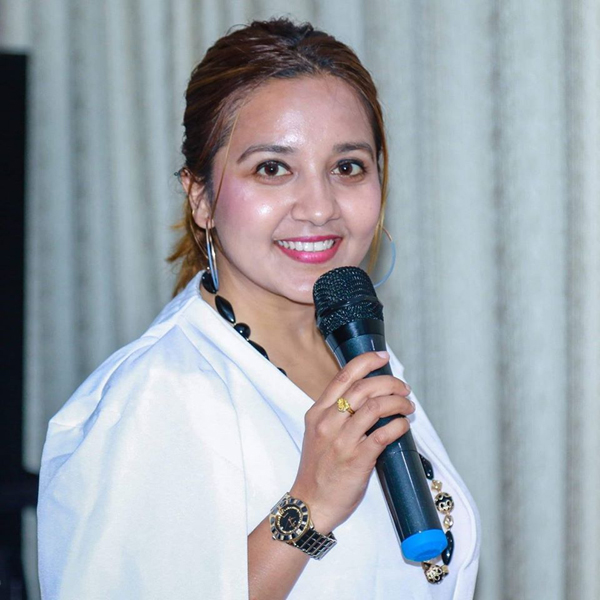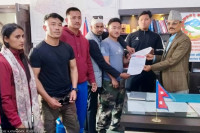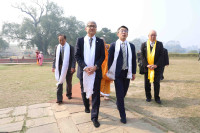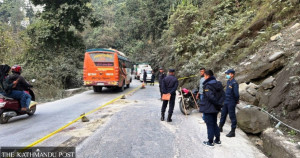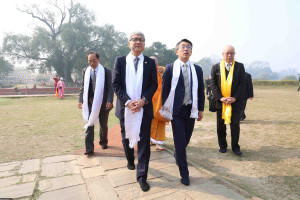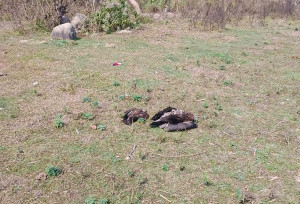Lumbini Province
Covid tests at Nepal-India border points show cases are surging
The constant movement of people across the border has also led to an outbreak of the virus among the health workers deployed at the border points.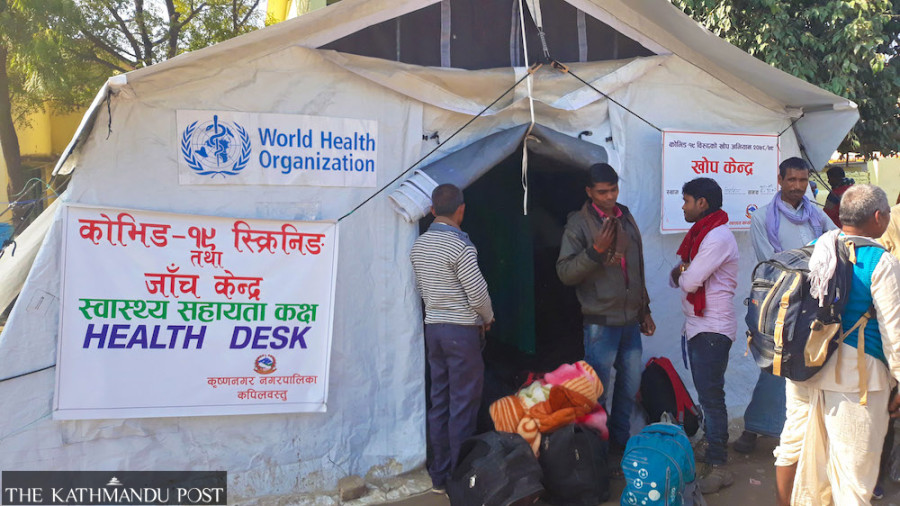
Sanju Paudel
The sudden uptick in Covid-19 cases along the Nepal-India border points in the last few days has worried health workers about the looming threat of the virus spreading in the communities.
While carrying out antigen tests on 328 people who entered Nepal Tuesday, 56 people were found to be positive for Covid-19. The figures were 45, 39 and 29 on Monday, Sunday and Saturday respectively, according to Loknath Kandel, a lab technician of the health desk set up at the Belahiya border point in Rupandehi district of Lumbini Province.
“The 45 positive samples from Monday have been sent to Kathmandu for a whole genome sequencing test,” said Kandel.
Although there are health desks set up at border points to screen those entering Nepal for Covid-19, health workers fear it is not enough to prevent the virus from entering villages and towns. Earlier, the government had set up isolation centres and quarantine facilities for those returning to their home districts. This year, authorities in several districts and local units have not prepared such facilities for returnees.
“During the first two waves of the pandemic, those who tested positive for the virus were taken to isolation and quarantine centres in their villages. But this year, there are no such provisions,” said Kandel. “Those who test positive are asked to go home and self-isolate but people are barely following safety protocols. Those carrying the virus are also roaming in public.”
Kamal Prasad Pandey, the assistant chief district officer of Rupandehi, said plans are underway to set up isolation centres and manage separate vehicles to take the infected people to their respective local units but the plans are yet to come into action.
The government authorities failed to make adequate preparations for the possible third wave of the pandemic as they have yet to introduce curbs on public movement, says Kandel.
“Although India has already declared a third wave, Nepal is allowing Indian tourists to come into Nepal if they are fully vaccinated. But even vaccinated people are carrying the virus,” said Kandel. “People here go to the bordering towns everyday. If this movement continues, it will be difficult to control the spread of the virus in the days to come.”
The free movement of people across the border has also led to an outbreak of the virus among the health workers deployed at the border points.
Junga Bahadur Bhandari of Bajura, an assistant lab technician from Siddharthanagar Municipality of Rupandehi, was deployed at the health desk in Belahiya border point three months ago. He tested positive for the virus this week.
“I tested positive during antigen testing a few days ago. A polymerase chain reaction test confirmed Covid-19 infection in me three days ago,” said Bhandari.
Diya Sharma, another lab technician deployed at the Belahiya health desk, also tested positive for the virus a few days ago.
“I might have caught the virus while collecting samples for testing at the health desk. The traffic at the border point has not abated even after the surge in the number of positive cases. People go to the bordering Indian towns to shop and do not follow health safety protocol. This has accelerated the rate at which the virus is spreading,” said Sharma.
Covid-19 cases are also surging in Jamunaha border point of Banke and Krishnanagar border point of Kapilvastu district.
A 38-year-old woman of Bardiya, who went to New Delhi to meet her husband who works there, was returning home through Jamunaha on Monday. She tested positive after an antigen test at the border health desk the same day. Twelve others tested positive at Jamunaha that day.
The figure significantly rose on Tuesday. As many as 37 entrants were found positive on antigen tests on 396 people at Jamunaha border point.
Of late, the number of people entering Nepal through Jamunaha border point has increased.
“Around 1,000 people enter Nepal through this border point on a daily basis. We have intensified testing and sent suspect cases to isolation centres. But many people are using alternate routes to enter the country,” said Gita Shahi, a health worker deployed at the health desk in Jamunaha border point.
Similarly, Covid-19 cases are increasing at Krishnanagar border point of Kapilvastu. According to Pankaj Gupta, the coordinator at the health desk set up at the border point, nine people tested positive for Covid-19 on Saturday. As many as 27 out of 151 antigen tests carried out on Monday came back positive. Fourteen more entrants tested positive on Tuesday.
“There are no isolation centres in Krishnanagar as of now. The infected people have been advised to stay in home isolation,” said Shankar Bhattarai, the health unit chief of Krishnanagar Municipality.
Covid-19 cases are also on the rise in Kanchanpur, a Tarai district of Sudurpaschim Province, as the district is seeing an increase in the number of migrant workers returning home from India.
On Tuesday, 86 people tested positive for Covid-19 in Kanchanpur. Seventy-one among them entered Nepal through Gaddachauki border point. According to the District Health Office, 15 people from various local units also tested positive for the virus.
A health desk set up at the Gaddachauki border point conducted antigen testing on 538 entrants who were returning home from various parts of India and 36 of them were found to be positive for the virus.
Kanchanpur, which borders India, currently has 330 active cases of Covid-19. According to the District Health Office, 79 infected people are receiving treatment at the isolation ward of the Mahakali Provincial Hospital while 251 are in home isolation.
On Tuesday, Nepal reported a total of 2,444 Covid positive cases, which included 1,981 positive cases from 10,648 polymerase chain reaction tests and 463 positive cases from 4385 antigen tests. Also, one death was reported.
(Rupa Gahatraj in Nepalgunj, Manoj Paudel in Kapilvastu and Bhawani Bhatta in Kanchanpur contributed reporting.)




 11.84°C Kathmandu
11.84°C Kathmandu